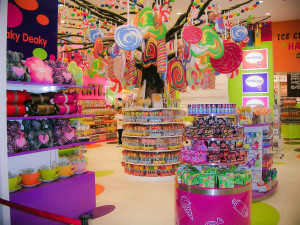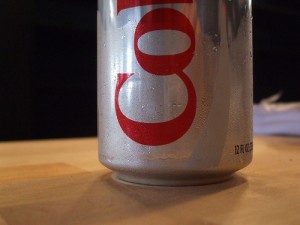When a candy-heavy holiday approaches (like Easter), I begin to think twice about the traditions I always had as a child. While candy was so exciting to receive as a kid in my homemade Valentine’s bag or my frilly Easter basket, as a mom, I now realize how much candy my kids are constantly exposed to and dislike the idea of giving them more and more.
Recently I reached out to a local dentist to find out whether my concerns were genuine and if the truth about sugar is as scary as I made it out to be.
Before you begin to fill Easter baskets this season, read Dr. Fleming of Richardson Dentistry’s responses below to some of my questions. It might cause you to think twice about the goodies you buy for your kids.

Is sugar really THAT bad for your teeth?
“In a simple answer, yes! Sugar and acid are the two most damaging substances to your teeth. Sugar in your mouth is digested and formed into acid by the bacteria that naturally occur on your teeth. The more often sugar is supplied to these bacteria, the more often your teeth will be demineralized (broken down) by acid. The key to protecting your teeth is in limiting the frequency of sugar/acid intake. The worst possible thing that someone can do is sip or snack consistently on something that has a high sugar or acid content. Snacking or sipping throughout the day never allows the pH of your mouth to get back to neutral and the acidic environment is maintained for hours. The prolonged exposure to acid is what leads to demineralization and eventually, tooth decay.”
Fruit has sugar! Is fruit bad for your teeth?
“Let me start by saying that I love to eat fruit, but most fruits have a fairly high sugar content in relation to other natural foods. Additionally, fruits like oranges, lemons, limes and other citrus fruits tend to have a high content of citric acid, which can also be harmful to teeth. Like other forms of sugar, the key is the amount of exposure to the sugar and acid. Eating fruit with meals or as a snack is no problem. Sucking on lemons (I have met a number of patients over the years that do this!) is terrible for your teeth because the acid and sugar exposure is over a long period of time and your teeth are never allowed to recover. However, fruit is a much better alternative than simple sugars such as sodas, cookies, candy, or fruit juices. Overall, fruit is a great thing for your health, so just be aware of how your are consuming your fruit….don’t keep that lemon in your mouth for hours and hours!”
 What about sugar alternatives that are used in drinks like Diet Coke? What about natural sweeteners?
What about sugar alternatives that are used in drinks like Diet Coke? What about natural sweeteners?
The sugar alternatives and natural sweeteners are typically not harmful to the teeth. Bacteria are not able to process and digest these substances like they can natural sugar. However, most diet drinks such as Diet Coke are extremely high in acid content! The acid in these drinks can demineralize enamel and lead to tooth decay in the same manner as acid produced by bacteria from natural sugar. Diet drinks are NOT ok for your teeth!”
Gum has sugar, but it also claims to keep teeth healthy? Is this better for you than other candies?
“Gum is great for your mouth for a number of reasons. Number one, it stimulates the flow of saliva, which is the natural protectant for your teeth. After a meal, saliva helps to wash away any debris and also sugar/acid so that the pH of your mouth returns from an acidic level to a neutral level, which is when teeth are not being demineralized. About an hour after a meal, the pH of your mouth returns to around 7 (neutral) from a low of about 5 during a sugar filled or acidic meal.
Gum with regular sugar is not recommended. Gum with the sugar substitute XYLITOL is what we recommend to our patients. Xylitol is not able to be digested by bacteria that cause tooth decay and leads to the reduction of the levels of these bacteria. Not only is this stimulating saliva, but it actually lowers the amount of harmful bacteria in your mouth that cause tooth decay. Some common types of gum that contain xylitol are: IceBreakers IceCubes Sugar Free and Trident Sugar Free.
If candy/sugar is going to be consumed, are there any that children (and adults) should absolutely avoid?
All sugar and candy is equally bad, but those candies and sweets that are sticky can be particularly bad. The sticky nature makes the candy stick to the surfaces of the teeth and can prolong the exposure of the teeth to sugar.
If I have sugar what should I do after I eat it?
If you are going to have sugar or acid, make sure to do it quickly. Sipping or snacking is the worst thing you can do because it leads to prolonged exposure and a low pH in the mouth. Eating or drinking quickly allows the pH of the mouth to more quickly return to neutral so that the damaging effects of sugar/acid are for the shortest time period possible. Rinsing with mouth or mouthwash after eating these types of food can also help remove any residual bacteria and return the pH to a normal level.
Do you recommend coming in for a check-up after each sweet-heavy holiday? (Valentine’s Day, Halloween, Easter)
“Most people can do check-ups every 6 months. Twice daily brushing and flossing and the use of mouth rinses can help to counteract the damaging effects of sugar and acid. Some patients with a high cavity risk can be recommended to be seen in the dental office more often because small cavities can be treated easily, while larger cavities often require additional and more costly work.”
What age do you recommend children come in for their first check up?
“The American Association Pediatric Dentistry recommends that each child have their first check-up by age one or when the first teeth are visible in the mouth. By age one, most kids have a number of teeth and those teeth can develop decay just like adult teeth. This age can be difficult to have a child stay still enough to have a dentist take a look, so most dentists enlist the help of the parents in doing a lap to lap method where the child is able to sit in the comfort of a parent’s lap while the dentist checks the teeth.”
If you’d like to learn more about how to protect and care for your child’s teeth, contact the staff at Richardson Dentistry in Richardson. Located near Belt Line & Plano Road, Dr. Fleming & Dr. Guirguis will help you and your children feel comfortable at every dental checkup. Visit their website at RichardsonDentistry.com or contact them at 972.690.8617 for more on pediatric, cosmetic, and general dentistry information!














